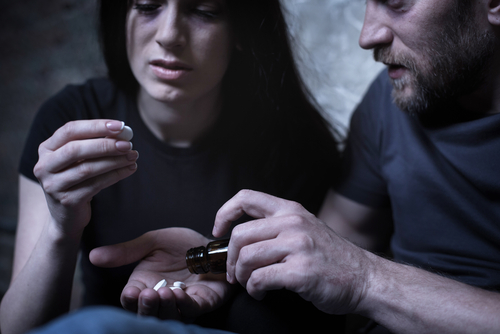Would you recognize prescription drug addiction if it happened to you or someone you love?
More than 6% of all Americans have abused prescription drugs, including teens and senior adults. Chances are, if you’re not affected, someone that you know is.
The most common types of prescription drugs that cause addiction include:
- Opioids, or narcotic painkillers
- Benzodiazepines, which are medications used to treat anxiety, panic, and seizure disorders
- Stimulants, which treat attention-deficit hyperactivity disorder (ADHD) and sleeping disorders
- Hypnotics, which are medications that are used to aid sleep in people with insomnia
It’s easy to miss the signs of prescription drug abuse. You might be in denial about your own drug use. You could just as easily have a family member who’s good at hiding the signs of their drug abuse.
You can’t get help if you don’t know there is a problem. If you know the signs and symptoms of prescription drug abuse, then you can recognize when you must get help.
What Are the Signs of Prescription Drug Abuse?
It can be hard to recognize the signs of prescription drug abuse. This is true whether you’re concerned about a family member or yourself.
A person who’s abusing prescription drugs will do whatever they can to hide what’s happening. Someone who’s addicted may change their behavior and become more secretive.
Look for the following signs:
- Changes in self-care, such as eating, sleeping, and hygiene
- Doctor-shopping, or visiting multiple doctors to get extra prescriptions
- Dosing medications too often or too high
- Getting extra medication from other people without a prescription and without your doctor’s advice
- “Losing” prescriptions or using them up too early
- Lying about how much medication you’re using
- Sudden mood changes, especially when medication isn’t available
- Withdrawal when you stop using drugs, which can lead to illness, pain and cravings
More Signs of Prescription Drug Addiction
Prescription drug addiction can leave signs around your house, car or room too. If you’re worried about a loved one, look for signs that include:
- Baggies or stash boxes containing pills
- Extra prescription bottles
- Items used to snort or inject pills, such as spoons, syringes, water bottles, and razor blades
- Powdered or crushed pills
- Prescriptions or prescription pads
- Stashed pills in multiple parts of the house
Having these items in your living space is probably a sign of addiction. If you’re looking for signs in a loved one’s space, then be extra careful. It’s common for people to hide their drug use from loved ones. Items that give it away may be hard to find.
Signs & Symptoms of Prescription Opioid Addiction
Prescription opioids are drugs that treat severe acute pain. They’re highly addictive after just a few uses. Some common prescription opioids include:
- Codeine
- Fentanyl
- Hydrocodone
- Hydromorphone
- Morphine
- Oxycodone
- Tramadol
Physical Symptoms
All opioids slow down the central nervous system. This causes symptoms that include:
- Confusion
- Dizziness
- Euphoria, or feeling high
- Sleepiness
- Slowed breathing
These are normal side effects of opioids that get stronger when you abuse the drug. If you start to notice these signs regularly, you could be addicted.
When you develop an opioid addiction, you’ll develop tolerance and withdrawal. These are both sure signs of physical addiction.
Tolerance happens when a normal dose no longer works for you. When you have tolerance, you’ll feel the need to take larger doses often in order to feel the effects of the drug.
Signs of Withdrawal
Withdrawal happens when you stop taking opioids after building a dependence. You’ll experience acute signs and late signs of withdrawal.
The early signs of withdrawal happen within the first 24 hours. They include:
- Insomnia
- Increased bodily fluids, such as sweat, tears, nasal fluids, and saliva
- Mood changes, including anxiety and agitation
- Muscle pain
- Restlessness
- Yawning
After a day or 2, you’ll experience late signs of opioid withdrawal. These include:
- Dilated pupils
- Diarrhea
- Fast heart rate
- High blood pressure
- Nausea
- Stomach pain
- Vomiting
These symptoms peak within 72 hours. Your withdrawal symptoms should lessen within a week or so.
Symptoms of Overdose
Addiction increases the risk of overdosing on prescription opioids. The symptoms of prescription opioid overdose include:
- Blue lips and fingernails
- Coma
- Difficulty breathing
- Extreme sleepiness
- Pale, clammy skin
- Slow breathing
- Slow heart rate
- Unresponsiveness
Call 911 immediately if you suspect a prescription opioid overdose. An overdose can be deadly in minutes. Use naloxone first if you have it available, then call 911. Naloxone can temporarily reverse the overdose, but it’s still important to get help.
Signs & Symptoms of Prescription Stimulant Addiction
Prescription stimulant drugs treat attention-deficit hyperactivity disorder (ADHD), narcolepsy, and sometimes obesity. Like opioids, stimulants can be addictive. Some examples of prescription stimulants include:
- Adderall
- Concerta
- Dexedrine
- Ritalin
Physical Symptoms
Prescription stimulants increase the activity in your central nervous system. This causes physical symptoms such as:
- Euphoria
- Faster breathing rate
- High blood pressure
- High heart rate
- High body temperature
- High blood sugar
- Increased energy
Tolerance and withdrawal are also common signs of addiction. If you’re addicted to stimulants, you’ll find yourself needing bigger doses and feeling sick when you can’t get them.
Signs of Withdrawal
When you use prescription stimulants long-term, your body becomes used to the chemical changes. If you stop using stimulants suddenly, you may experience withdrawal signs. They include:
- Depression
- Desire to sleep
- Dysphoria, or a nonspecific feeling that something is wrong
- Hunger
- Lack of interest in activities
Withdrawal from stimulants often looks like severe depression. You may do nothing, but sleep. The symptoms set in within a day of the last drug use. They can last up to 2 weeks.
Symptoms of Overdose
Overdosing on prescription stimulants is life-threatening. The signs of an overdose include:
- Abdominal pain
- Coma
- Diarrhea
- Extremely high blood pressure
- Heart attack
- Nausea and vomiting
- Seizures
You can die from a prescription stimulant overdose. Call 911 immediately if you suspect someone around you is overdosing. Without medical help, a stimulant overdose can cause death.
Signs & Symptoms of Prescription Benzodiazepine Addiction
Prescription benzodiazepines (or benzos) are drugs that treat anxiety, panic disorders, and seizures. It’s common for benzos to cause addiction within 2 weeks of normal use. You can develop addiction even faster if you abuse benzos.
Some examples of prescription benzos include:
- Ativan
- Halcion
- Librium
- Restoril
- Tranxene
- Valium
- Xanax
Physical Symptoms
Benzos increase the amount of gamma-aminobutyric acid, or GABA, in your brain. GABA is a neurotransmitter that affects mood, memory, emotions, and even breathing.
Abusing benzos causes your body to flood with GABA. This causes symptoms such as:
- Confusion
- Drowsiness
- Dizziness
- Euphoria
- Memory problems
- Trouble thinking
- Trouble moving
When you’re addicted to benzos, you’ll also experience tolerance and withdrawal. These are the most common signs of benzo addiction.
Signs of Withdrawal
Benzo withdrawal can be dangerous without medical help. You should seek medical help to stop using benzos.
The signs of benzo withdrawal include:
- Crawling sensations
- Delirium, or trouble recognizing reality
- Insomnia
- Mood changes, including depression, anxiety, and panic
- Muscle spasms
- Nausea
- Pain
- Seizures
You may experience seizures from benzo withdrawal, which are very dangerous. You’re more likely to have life-threatening withdrawal if you have used benzos for 6 months or longer.
Call 911 if you have seizures or delirium while withdrawing from benzos. These are signs of a life-threatening response to withdrawal.
Symptoms of Overdose
The signs and symptoms of benzo overdose include:
- Amnesia, or an inability to access your memories
- Coma
- Excessive sleepiness
- Inability to wake
- Respiratory depression, or slow breathing
- Slurred speech
- Slow reflexes
- Slow movement
Benzo overdose can be lethal. Call 911 if you think someone is overdosing on benzos.
Signs & Symptoms of Prescription Hypnotic Addiction
Hypnotic drugs treat sleep problems such as insomnia. They’re addictive within just a few days of use. They include:
- Ambien
- Intermezzo
- Lunesta
- Sonata
Physical Symptoms
These drugs work similarly to benzos, but they have a different chemical structure. When you use them at doses that are too high, they can cause physical side effects.
The symptoms of sleeping medication abuse include:
- Confusion
- Double vision
- Dizziness
- Lightheadedness
- Memory loss
- Sleepiness
- Sleepwalking
Signs of Withdrawal
Withdrawing from hypnotics can start within 2 days of your last dose. The signs of hypnotic withdrawal include:
- High heart rate
- Hyperventilating, or breathing too fast
- Nausea and vomiting
- Speech problems
- Tremors
- Restlessness
- Sweating
These signs can last up to 10 days after your last dose of sleeping medication. Some people withdraw more quickly than others, depending on their age, health, and drug use history.
Symptoms of Overdose
If you overdose on sleeping pills, the symptoms may include:
- Extreme sleepiness
- Inability to wake
- Slow reflexes
- Unresponsiveness
- Vertigo
In extreme cases, the signs can include coma and respiratory failure. These symptoms can lead to death if the overdose isn’t treated. Call 911 right away if you suspect a sleeping medication overdose.
What Are the Signs You Need Treatment for Prescription Drug Addiction?
You need treatment for prescription drug addiction if it’s affecting your quality of life.
It’s common for people to think that prescription drugs are less harmful because they’re not illicit street drugs. That isn’t true. When you abuse prescription drugs, every part of your life is at stake.
The signs that you need prescription drug addiction treatment include:
- An inability to stop using drugs
- Neglecting your health and hygiene
- Neglecting your relationships
- Struggling to keep a job
- A history of relapse
Our treatment center directory can help you find prescription drug addiction treatment. Inpatient or outpatient programs offer the right level of care for your needs, no matter what they are. Find a treatment center today and start your recovery journey!


